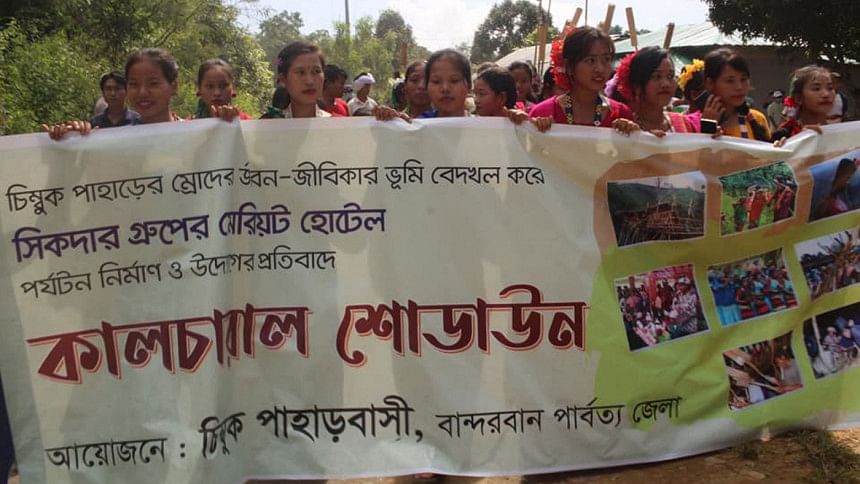The bloody view from the resort in the hills

The announcement that a five-star "Marriott Hotel and Amusement Park" is being built in Bandarban no doubt comes as welcome news to Bengali elites and the nouveau riche looking for novel and Instagrammable ways of spending their weekends and disposable incomes in the luscious hills of the CHT. When completed, the project promises to be "one of the best tourist spots in the country" with a main hotel building, 12 separate villas, cable cars to transport tourists from one hill to another, amusement rides, and swimming pools. Surrounded by picturesque green hills and check posts at every corner, the Bengali traveller can be transported to heaven on earth, without so much as the inconvenience of interacting with the locals—unless, of course, it is to revel in their colourful costumes, exotic food and primitive ways of life under the ever-watchful eyes of security forces—or confronting the bloody history of the region.
To the Mro community living on these hills for generations, however, the project, like so many other tourism ventures in the area, means displacement, dispossession, and loss of livelihoods. It signals intimidation, threats, harassment—and worse—should they make too much noise against it. Defying the fear of retaliation, however, members of the Mro community organised a "cultural showdown" this week to urge the authorities to stop the construction of the hotel. They said that 1,000 acres of jhum land were being grabbed for the project and that, if implemented, it would displace six villages of the Mro community, indirectly affect another 70 to 116 villages and leave around 10,000 jhum cultivators landless and without a livelihood. Earlier, the Mro villagers residing in Kaprupara, Dolapara, Erapara and Chimbuk Pahar sent a petition to Prime Minister Sheikh Hasina calling for a halt to this construction.
In 2019, The Daily Star reported that 170 families from three villages of Bandarban Sadar Upazila were facing eviction to make way for a five-star hotel. According to the village chiefs, the owner, Jashim Uddin (Montu), chairman of Sylvan Wye Resort and Spa Ltd. and younger brother of Awami League lawmaker Nazrul Islam Chowdhury of Chattogram-14 (Chandanaish and parts of Satkania upazila), started the land grabbing process two-and-a-half years ago. Initially, he lent money to distressed families and when they failed to pay back their loans, he evicted them from their land. Those who resisted were threatened; the owner's goons allegedly set fire to a rubber garden and filed false cases against locals to intimidate them. Jashim claimed that he had bought all of the land himself, even though as a non-permanent resident of the CHT, he was simply not eligible to buy land, as per a 1989 gazette notification. He even received clearance from the Hill District Council and DC's office, allegedly in exchange for bribes. Meanwhile, he donated a little less than an acre of the grabbed land for a two-storey police camp and, in his own words, "donated Tk 26 lakh to build the camp" after "discussing the matter with top police officers and local leaders."
Such tourism projects—both public and private ventures—are now commonplace all over the CHT. An overwhelming majority of them are undertaken without the consent of the local communities and/or in violation of the procedures laid down by the CHT Peace Accord. According to research published in 2015, 1,700 acres of land had been allocated to build tourist resorts, resulting in the eviction of more than 700 Jumma families from 26 villages. These numbers have increased exponentially over the last five years, particularly in Bandarban, with very little recourse available to local communities to contest or resist the land grabbing by powerful actors, as the latter often have direct or indirect blessings of the local administration and/or security forces.
All tourism and development activities in the CHT are supposed to take place with the informed consent of the community through the concerned village karbaris and mauza headmen, and approval from the Hill District Council (HDC) and CHT Regional Council, as per the CHT Accord. It seems fruitless and almost formulaic at this point to have to remind the government that 23 years on, many important clauses of the Accord, particularly those concerning land disputes and land rights of the Jumma communities, have not been yet implemented, including recognition and recording of the land rights of the indigenous people, cancellation of illegal leases and settlements given to non-residents of the CHT, and the setting up of a Land Commission to resolve all disputes pertaining to illegally grabbed lands. The Land Commission was formed in 1999, but so far it has not finalised its rules of business, recruited manpower or set up offices in the three districts. At least 22,090 complaints are pending with the commission, with no guarantee when, if ever, these disputes will be resolved.
In most cases, the Jummas do not have formal titles to the land, as traditionally jhum cultivation was carried out collectively. Over the last two decades, the Land Commission has made no headway at all in codifying, translating or operationalising the customary land laws and practices of the indigenous communities. Without any progress on this front, it becomes all the easier for developers to target and grab land of economically, socially and culturally marginalised Jummas. Moreover, as Shapan Adnan and Ranajit Dastidar documented, in their book "Alienation of the Lands of Indigenous Peoples in the Chittagong Hill Tracts of Bangladesh" published in 2011, in many cases, the DC office classifies common lands of the communities as khas land or state property when leasing them out to private parties. They conclude that "[s]tate acquisition of the traditional lands of the IP [indigenous people] for tourism facilities has become a massive threat in the Bandarban district, particularly from projects being floated by the security forces."
In 2014, the power to make decisions regarding tourism in the CHT was formally handed over to the Hill District Council in fulfilment of the promises made in the Accord. The HDCs are supposed to represent the interests of the indigenous people, but the last time an election was held was in 1989, which means that for over two decades, the councils have been run by those chosen by the ruling parties. Despite repeated appeals by indigenous groups and civil society to make the councils functional to resolve the long-standing conflict in the region, successive governments have refused to take constructive steps to hold elections, systematically denying the Jumma people of their political rights.
According to news reports, the proposed Marriott hotel is being built under a 35-year lease and profit-sharing agreement between Army Welfare Trust and R&R Holdings Limited, a concern of Sikder Group. When contacted by The Daily Star, the chief coordinator of Sikder Group denied allegations of land grabbing in the hill, arguing that they had leased the land from the Bandarban Zila Parishad (District Council) in return for an eight-percent share. On the other hand, Mong Shwiching Chak, a member of the Bandarban Zila Parishad, denied having entered into such an agreement. Which version of the story are we expected to believe? Can the HDC even lease out the land if the people to whom the land belongs are against it? A statement put forth by the Chittagong Hill Tracts Commission argues that there is, in fact, "no legal basis [for the HDC] to provide consent as the Council does not have the legal title to the concerned land in the first case, and can provide consent only if there is a valid title in the first case."
Over the decades, tourism initiatives, alongside numerous other development projects, have been promoted—rather, imposed—by successive governments without any consideration of what the Jumma people want and often at great cost to their lives and livelihoods. The indiscriminate destruction of hills, forests and cultivable lands in the CHT has been undertaken without any environmental or social impact assessments. Many communities are left without cultivable lands and are suffering from extreme food insecurity, not least in the scenic venue of Sajek. There are not enough schools, hospitals or other essential services, especially for the Mro community, which remains the most marginalised among all indigenous groups in the CHT.
The government's defence that all these tourism and development initiatives will lead to progress and betterment of the locals rings as hollow as the Brits' justification of colonialism by citing the construction of the railways. It is evident that the resources of the CHT are up for grabs by anyone—multinationals, forest department, security forces, ministry of tourism, Bengali settlers—except those who have real claims over them. The rampant land grabbing is made possible by the increasing militarisation of the region, continued impotency of the civil administration, and double standard of the government about its commitment to upholding the promises made in the Peace Accord.
It is also made possible by the complicity of Bengalis like us who remain in blissful ignorance of the fact that the picturesque Kaptai Lake was the byproduct of the Karnaphuli hydro-electricity project, which submerged at least 54,000 acres of land and displaced over one third of the population, or that the scenic Nilgiri resort was built on the occupied homes of 200 Mro and Marma families. We ask no questions as to why we must pass through so many check-posts in a non-conflict, non-occupied zone, or why there should be a directive barring Bengalis and foreigners from outside the Hills from speaking to Jummas without the presence of government officials. We see only what we want to see—hills devoid of history, there for our pleasure, consumption and control.
Sushmita S Preetha is a journalist and researcher.

 For all latest news, follow The Daily Star's Google News channel.
For all latest news, follow The Daily Star's Google News channel. 



Comments